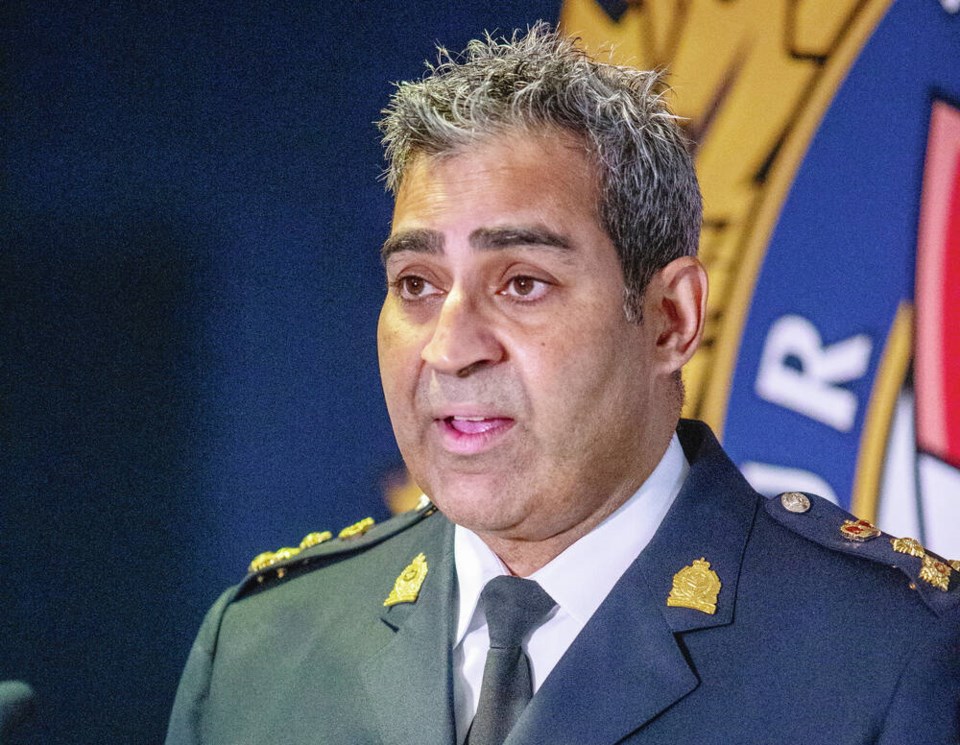Victoria Police Chief Del Manak says it’s “highly encouraging” that the B.C. Prosecution Service is hiring 40 new Crown counsel, but he also wants to see funding for a new south Island police officer to monitor high-risk offenders before they commit more violent crimes.
“I don’t have a team of officers that has been funded now to go out and to really target repeat offenders that are violent in our community, so I’m going to be doing it with the same resources that I have,” said Manak.
The B.C. Prosecution Service launched a recruitment drive this week to hire 40 prosecutors and 21 staff across the province. They will fill existing as well as projected vacancies, partly as the result of new action teams to tackle the problem of prolific violent offenders causing chaos in urban areas.
The response teams will be made up of police officers, 21 dedicated prosecutors, 21 probation officers, 21 support personnel and nine correctional supervisors. The province also plans to add 12 mental-health response teams, some Indigenous-led.
The new teams will be supported through a new $12-million provincial commitment, according to the prosecution service.
The Opposition Liberals have been critical of what they call a “catch-and-release” policy, where repeat offenders are arrested for violent attacks and released on bail soon afterwards.
Premier David Eby has said federal changes to the bail system in 2019 made it more difficult to hold people who commit repeat violent offences in custody until they stand trial.
Former attorney general Murray Rankin in November issued a revised bail policy to Crown counsel to implement a “clear and understandable approach to bail for repeat violent offenders.” He asked judges to keep those deemed repeat violent offenders behind bars while awaiting trial on new violence or gun charges.
Rob Gordon, a professor emeritus of criminology at Simon Fraser University, said the province clearly thinks part of the solution is to “bring pressure to bear on the federal government to take another look at bail … and I think that’s probably a smart move.”
Soon after Eby was sworn in this fall, he unveiled the province’s Safer Communities Action Plan, which includes increasing staffing in courts, among other things, but “it doesn’t really add any resources for the police to be proactive in identifying and arresting and bringing before the courts violent repeat offenders,” said Manak.
The police chief said the frequency of “extremely public and disturbing incidents” has caused community outcry.
Manak said he’ll be working with the deputy regional Crown counsel to form a working group to establish the criteria to define and identify repeat violent offenders, and start the collaborative process to apply a more strict interpretation of the existing federal legislation “to protect our communities, because right now, that’s not happening.”
At the same time, Manak wants to see the province invest, even as a pilot program, in one regional police position dedicated to high-risk offenders, to ensure a co-ordinated approach to monitoring them upon their release on bail — “instead of responding after the fact to a violent incident or a violent attack.”
When violent individuals with lengthy criminal records out on bail know they are being monitored, they are far more likely “to stay crime-free,” said Manak.
In November, Eby announced $230 million in funding to fill vacancies in rural RCMP detachments and hire additional officers for specialized forces. That will help in RCMP jurisdictions, “but they’re not helping any municipal police agency, like 91įŁ┤┤ police or Victoria police,” said Manak.
Timelines for filling the action teams are still under discussion, said B.C. Prosecution Service spokesman Dan McLaughlin.
The teams are based on B.C.’s Prolific Offender Management program, which ran from 2008 until 2012, when it was defunded. It brought together community partners, including police, mental-health and community support providers, “to monitor and help offenders break the cycle of repeat offending.”
Peter Juk, assistant deputy attorney general, this week called the recruitment drive a “great opportunity” for skilled courtroom lawyers and professional staff looking to make a positive impact. Applicants must have at least six years of trial experience and the pay for seasoned lawyers is up to $200,000.
Crown counsel are responsible for deciding whether to lay charges recommended by police and which charges to lay under the Criminal Code.
There are about 550 Crown counsel throughout B.C., divided into five regions, including 91įŁ┤┤ Island-Powell River. There are 69 full-time Crown counsel in the 91įŁ┤┤ Island region. Positions are available in Victoria and Nanaimo.
The closing date for applications is Feb. 5.



